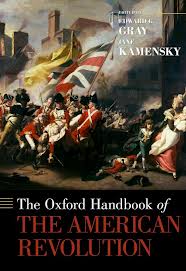 Today I depart from my regular post schedule to bring you a 6 post series recapping the American Revolution Reborn Conference, the first conference dedicated to the American Revolution since the Bicentennial.
The conference took place in Philadelphia between Thursday May 30 and Saturday June 1. Nearly 300 people attended. Academics, public historians, and enthusiasts alike contributed to the conversation, which centered on 4 themes: Global Perspectives on the American Revolution, the American Revolution as a Civil War, Violence and the American Revolution, & Power and the American Revolution. Roundtable discussions opened and closed the conference.
Today I depart from my regular post schedule to bring you a 6 post series recapping the American Revolution Reborn Conference, the first conference dedicated to the American Revolution since the Bicentennial.
The conference took place in Philadelphia between Thursday May 30 and Saturday June 1. Nearly 300 people attended. Academics, public historians, and enthusiasts alike contributed to the conversation, which centered on 4 themes: Global Perspectives on the American Revolution, the American Revolution as a Civil War, Violence and the American Revolution, & Power and the American Revolution. Roundtable discussions opened and closed the conference.
I hope that these posts will add more context and depth to the tweets attendees sent from the conference. (Michael D. Hattem has storifyed the tweets). Between today and Monday, I will post brief summaries of each panel and roundtable. This conference raised a number of questions and points that scholars of the American Revolution should be aware of.
Opening Roundtable
Moderator: Daniel Richter
Discussants: Jane Kamensky & Edward Gray
Biggest Takeaway: The ideological and social arguments of the American Revolution explain why the Revolution happened. Scholars must study how it happened to “rebirth” the study of the Revolution.
Biggest Question: Should new scholarship ignore ideology or use it as a tool to get at how the Revolution happened and how contemporaries conducted the war and politics?
 Panel Summary
Panel Summary
Since the 1960s nearly all scholarly and popular works portray the American Revolution as either a story of how the colonists conducted a revolution of ideas or how poor, downtrodden colonists caused the Revolution by advocating and pushing for social change. Kamensky, Gray, and other audience members advocated that new scholarship on the Revolution should depart from the old historiography. Kamensky & Gray took the first steps in their [amazon_link id="0199746702" target="_blank" container="" container_class="" ]Oxford Handbook of the American Revolution[/amazon_link]; none of its 632 pages discuss ideology.
Sampling of Audience Remarks
Thomas Slaughter questioned whether there has ever been a debate surrounding the Revolution. He believes that scholars will need to grapple with power, gender, class, slavery, and the larger problems of the British empire to create better narratives. Historians will also need to engage and debate the ideological argument.
Linda Colley would like historians to compare the American Revolution with other revolutions. Comparison will allow scholars to see new avenues of exploration for their topics.
Fredrika Teute believes that historians need to wrap their minds around the reality and rhetoric of enslavement. Neither the ideological nor the social history-centered narratives knew how to incorporate and deal with slavery.
Tomorrow: Recap of the Global Perspectives panel
Feel free to agree or engage with the points and questions raised by this conference by leaving a comment.